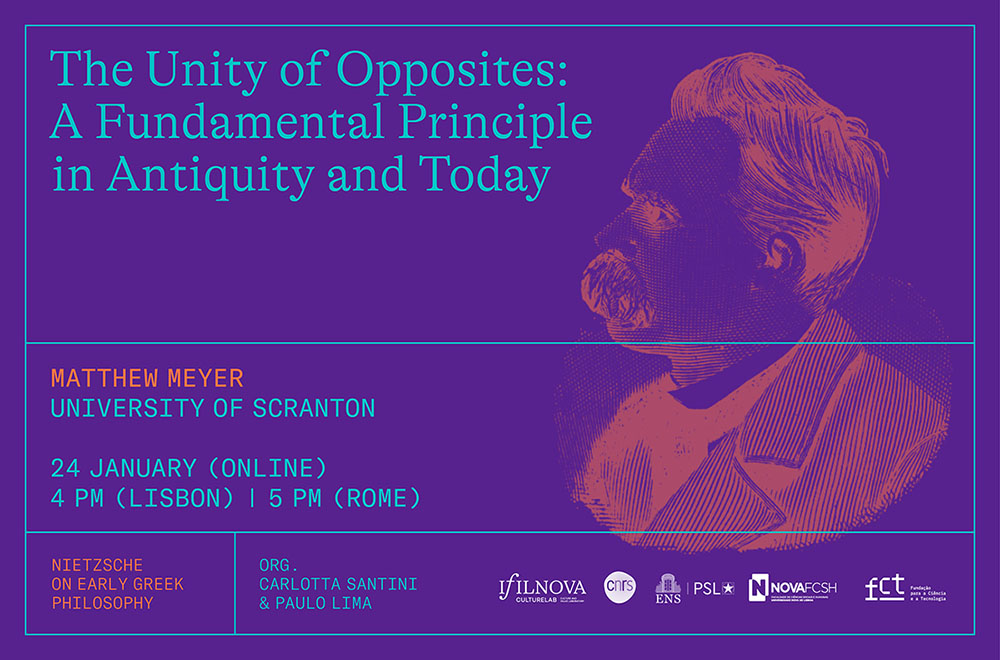Matthew Meyer

24 January | 4 PM (Lisbon)
5 PM (Rome) | for other locations click here.
Abstract
Nietzsche begins Menschliches, Allzumenschliches (MA) with the claim that the philosophical problems of today take the same form as some two thousand years ago. In this talk, I will try to make some sense of Nietzsche’s claim and even make good on it. The “problem of opposites” that Nietzsche identifies at the beginning of MA points back to his understanding of the opposition between Heraclitus and Parmenides in Die Philosophie im tragischen Zeitalter der Griechen. There, the problem of opposites turns on the question of whether reality can be construed in terms of what I call “dynamic relations” or whether there must be some thing—a “being” or “thing-in-itself”—that is non-relational. I will argue that Nietzsche’s understanding of these pre-Socratic thinkers is both philosophically elegant and philosophically relevant. Specifically, I will contend that it provides us a better way of understanding the philosophies of Heraclitus and Parmenides than interpretations currently on offer in the Anglo-American secondary literature, and I will show that the issue of whether reality can be understood in terms of relations only is now a central question in contemporary debates in the philosophy of science.
Matthew Meyer (University of Scranton)
Nietzsche On Early Greek Philosophy | Online Seminar
Org. Paulo Lima (Lisbon Nietzsche Group/Research Group on Ancient Philosophy/IFILNOVA) and Carlotta Santini (CNRS/ENS, Paris)
The seminar seeks to explore the dialogue between Nietzsche and early Greek philosophy during the period when he was Professor of Philology at the University of Basel. This is a subject that has not been studied in a systematic way, although there are some decisive contributions showing its importance for understanding Nietzsche’s philological and philosophical thinking. Our purpose is to provide a platform on which contributions from specialists in Nietzsche and ancient philosophy can be presented, debated, and complemented to fill this gap in Nietzschean studies. Key topics of the sessions will be Nietzsche’s activity as a scholar of ancient doxography on early Greek philosophy, his general conception of what he called the “pre-Platonic philosophers”, as well as his interpretation of some of these philosophers. The body of texts to be studied during the sessions includes not only the published ones, but also Nietzsche’s lectures, notebooks, and correspondence. The seminar is part of the activities of the Lisbon Nietzsche Group and the Research Group on Ancient Philosophy (CultureLab/IFILNOVA). It is the result of a collaboration between IFILNOVA, the Centre Nationale de Recherche Scientifique, and the École Normale Supérieure (Paris). It will take place monthly starting from October 2023 and will have nine sessions. It will be open to all interested parties, who will be able to register for each session by contacting the organizers (plima@fcsh.unl.pt, carlottasantini@hotmail.it). For more details, please see the programme below.
Next sessions
Session 5
28 February, 4 PM (Lisbon) | 5 PM (Rome) | for other locations click here.
Helmut Heit (Klassik Stiftung Weimar), “Nietzsche and Protagoras”
Session 6
27 March, 4 PM (Lisbon) | 5 PM (Rome) | for other locations click here.
Yannick Souladié (ENS, Paris), “The ‘Tremendous Leap of Anaximander’: Nietzsche’s New Understanding of the Apeiron”
Session 7
8 May, 4 PM (Lisbon) | 5 PM (Rome) | for other locations click here.
André Laks (Universidad Panamericana, México/Sorbonne Université, Paris): “Nietzsche doxographus”
Session 8
5 June, 4 PM (Lisbon) | 5 PM (Rome) | for other locations click here.
Daniel Conway (Texas A&M University), “How Socrates Became What he Was: The Evolution of a Diagnosis”
Session 9
19 June, 4 PM (Lisbon) | 5 PM (Rome) | for other locations click here.
Anne Merker (Université de Strasbourg), “Nietzsche, Heraclitus, and Polemos”
Event supported by the Foundation for Science and Technology (Fundação para a Ciência e para a Tecnologia) of the Portuguese Ministry of Education and Science under the projects UIDB/00183/2020 and UIDP/00183/2020.

